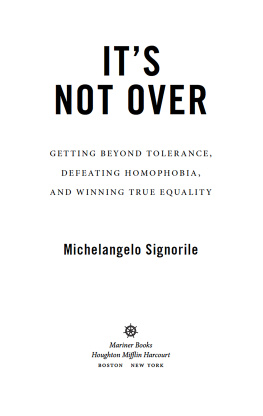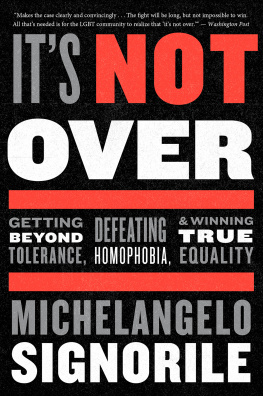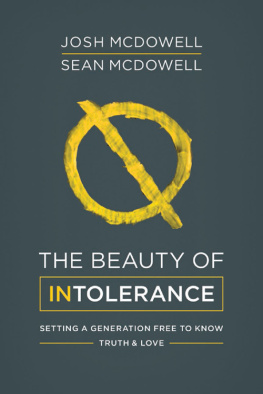First Mariner Books edition 2016
Copyright 2015 by Michelangelo Signorile
All rights reserved
For information about permission to reproduce selections from this book, write to or to Permissions, Houghton Mifflin Harcourt Publishing Company, 3 Park Avenue, 19th Floor, New York, New York 10016.
www.hmhco.com
Library of Congress Cataloging-in-Publication Data:
Signorile, Michelangelo, date.
Its not over : getting beyond tolerance, defeating homophobia, and winning true equality / Michelangelo Signorile.
pages cm
ISBN 978-0-544-38100-1 (hardback) ISBN 978-0-544-40958-3 (ebook) ISBN 978-0-544-70523-4 (pbk.)
1. GaysUnited StatesSocial conditions. 2. Gay rightsUnited States. 3. HomophobiaUnited States. I. Title.
HQ76.3.U5S535 2015 323.3'2640973dc23 2014044509
Cover design by Laserghost
v2.0416
In memory of Sarah Pettit
Authors Note
ITS NOT OVER LOOKS AT dramatic, ongoing transformations in politics, society, and culture whose effects are focused on lesbian, gay, bisexual, and transgender Americans. Those termslesbian, gay, bisexual, and transgenderdescribe distinct groups and identities that have intersected as a people, though each group has its own unique history. The acronym LGBT is useful as an umbrella term in that it encompasses all the groups without negating the important differences among them. The challenge that anyone writing about these groups faces is to balance keeping them visible both separately and together, all without being repetitive. My hope is that readers appreciate and understand the inherent challenges in writing about these groups and their intersections, as well as the spirit of my undertaking. I have done my best to represent everyone Im writing about by alternating among the historical, all-encompassing use of the word gay, the term LGBT, and more specific combinations of the words that acronym comprises.
In a similar way, this book often uses the word homophobia to encompass biphobia, lesbophobia, and transphobia. Again, it would be challenging and cumbersome to use all of these words in every instance. I use certain words, such as transphobia, throughout the book when they are relevant and appropriately specific, but I rely primarily on the term homophobia to draw together several different but interrelated phenomena.
When I write about the closet in Its Not Over, I discuss it as it relates to sexual orientation, not gender identity. There is long-standing agreementamong mental-health professionals as well as gay activiststhat closeting ones sexual orientation exerts psychological costs and causes harm. For transgender people, the idea of the closet, and publicly acknowledging being transgender, takes on a much different meaning. Its been a topic of discussion for some time among transgender activists and writers, whose work should be read to help people become more informed of the ongoing conversation.
Its Not Over often quotes listeners to my radio program, as well as interviews from the show. For context, The Michelangelo Signorile Show is a news, commentary, and call-in show covering progressive and LGBT political and cultural issues. The show began on SiriusXMs OutQ channel (the first national LGBT radio channel) and, after ten years, moved to SiriusXM Progress, in July 2013. It airs three hours each weekday afternoon all across the United States and Canada. On Progress, the show has a larger, diverse mix of LGBT and heterosexual listeners. Most are progressives, but many, Im happy to say, are conservatives who call in to challengeand be challengedand to spark discussion. The listeners are diverse in many other ways as well. They come from every geographic region, for example, as the show is heard from big cities to small towns and even in the most remote rural areas of the United States and Canada.
I also often refer toand use passages frommy opinion pieces, interviews, and analysis on Huffington Post in this book. Serving as editor at large of Huffington Posts Gay Voices vertical since November 2011 has been a dynamic experience, and much of the input I have received from the large and diverse readership there is also reflected in this book.
Victory Blindness
THE DANGEROUS ILLUSION THAT WEVE ALMOST WON
IMAGINE A GROUP OF PEOPLE who have spent decadesgenerations, centuriesin fear, invisibility, struggle, and silence. Imagine they find their voice, only to be decimated by an era of death and unthinkable loss made more bitter by crushing societal indifference to their predicament.
Now imagine that, in a matter of a few short years, everything seems to change. At what feels like light speed, they make momentous gains. The world begins to open its arms to them in ways they had never thought possible. The experience is powerful, exhilarating, spellbinding even. It feels like they are living in a dream. But behind that dream is a reality more treacherous than many of them may vaguely imagine.
Over the past few years, lesbian, gay, bisexual, and transgender Americans have been living in that dream. In 2011 the onerous dont ask, dont tell law banning gays and lesbians from serving openly in the military was repealed. The destructive force of the Defense of Marriage Act disintegrated in 2013 when a thunderous Supreme Court ruling in U.S. v. Windsor struck it down. In rapid succession, state after state, from the coasts well into the heartland, transformed into what appeared to be bastions of full equality as thousands of gay and lesbian couples marched down the aisle. Even deep in Mormon Utah and in Oklahoma, the buckle of the Bible Belt, federal judges threw out hateful bans on gay marriage, and the issue worked its way back up to an apparently sympathetic Supreme Court.
We saw LGBT people represented in movies, in music, and on TV in ways wed not experienced before. Not only were gay and transgender characters more visible than ever, but also openly gay, lesbian, bisexual, and transgender actors were more and more often invited to play these roles. A same-sex mass wedding occurred at the Grammy Awards. Ellen DeGeneres, a lesbian comedian, made an enormous comeback after her sitcom was canceled the year following her coming out in the 1990s, to become a daytime television sensation. Rosie ODonnell was back on The View and more outspoken than ever. A transgender actress, Laverne Cox, stood tall on the cover of Time magazine. Apples Tim Cook made a huge impact in the business world, becoming the most high-profile CEOand the only one among the Fortune 500 companiesto come out, proclaiming he is proud to be gay.
Since the mid-90s many people with HIV were no longer suffering and dying; they were increasingly thriving and the picture of good health because of life-saving drug treatments. Gaystraight alliance groups were formed in schools across the country, and LGBT people began to come out of the closet at ever-younger ages. Even in the world of sports, visibility arrived in unprecedented ways. A midcareer NBA player, Jason Collins, came out as gay, and even the barrier of the macho world of football broke when Michael Sam became the first openly gay player drafted to the NFL and shared his happiness by expressing his love, kissing his boyfriend for all of America to see.
In seductive ways, it started to feel as if we had almost finally made it, that we were just about equal in the eyes of most of the American people. The media reported on dizzying poll results that seemed to point to acceptance. We heard cheering and huge sighs of relief as many soaked up the success that now seemed so evident. Like many people, I even noticed my Facebook feed regularly erupting with posts expressing congratulations or disbelief about seeing these great strides in our lifetime.











